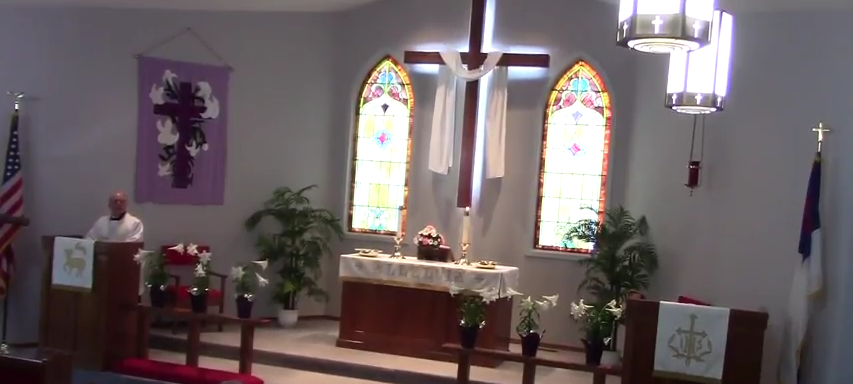
A Word of Blessing; A Word of Power
By James Wiese on May 19, 2017
Sermon for 2nd Sunday of Easter – Quasi Modo Geniti April 23, 2017
Text: John 20:19-23 Revised 3-year series B 17:2009
Theme: A Word of Blessing; A Word of Power
Have you noticed that whenever a person blesses or curses something by his own authority, nothing really happens? How many sleepless people haven’t angrily yelled at a neighbor’s dog barking at midnight? How many amateur carpenters haven’t howled in pain at a run-a-way hammer striking their thumb? But whatever really happens as a result of such cursing? No lightning flashes to punish that which was cursed. That goes to show that man’s curse is an empty wish on his part. Men huff and puff, but on their own they accomplish nothing.
The same is true when a man blesses by his own authority. He may wish and hope, but he has no ability to make it happen. How many “bless yous” have been spoken with little to no result?
But when God blesses or curses, things happen. God utters a curse upon rebellious sinners and the ground opens to swallow them alive. Fire and brimstone fall from heaven and destroy cities. Armies are wiped out or lose their will to fight because God speaks against them.
A similar thing happens when God blesses. A wandering Abram is given a great name, many descendants and “a land flowing with milk and honey.” A poor widow’s jug of oil and jar of flour never run dry during a famine that lasts 3 ½ years. A paralytic not only has his sins removed, but he rises, folds his mat, and walks home for the first time in his life. All take place when God speaks.
Unlike man’s word, God’s word is a word of power. When He speaks, things happen.
So it was that when Jesus stood before His disciples and said, “Peace be with you!” it happened. That was more than Jesus wishing that his friends would have a nice day. His blessing removed their fears immediately. Likewise, when He says, “If you forgive anyone his sins, they are forgiven,” it happens. These were Words of Blessing backed by Power that could grant what He said.
I. It drives out fear.
On the evening of that first Easter day, Jesus’ disciples were full of fears. The Master had been arrested and put to death just three days before this. His enemies who had screamed for His death might now be looking for the disciples. Would they have to undergo painful deaths, too? Fear so overwhelmed them that they barred themselves behind locked doors. Everything that mattered to them had been taken away when the Lord Jesus died.
Suddenly, in the midst of their fears, the Lord Jesus stood among them, saying: “Peace be with you.” Wow! What an effect His word of blessing had on their hearts! There He stood not just wishing them peace, but actually imparting peace to their trembling lives. It was as if a miracle took place and changed them in an instant. Their fears flew out the window and their hearts were at rest. As Jesus showed them the nail holes in His hands and feet, they realized Jesus was exactly who He claimed to be. And they knew that He had done exactly what He had said He would do. You see, His words were true because they are Words of Power and Blessing. When He speaks, it happens.
I don’t know that we fully understand the indescribable calm and rest which the Lord Jesus’ living presence gave these scared disciples. All of them felt it, except for the one who wasn’t there – Thomas. He missed it that night. But when he was with them a week later and Jesus appeared again, he felt the same power and blessing come over him. It drove out all fear –fear for their enemies, fear for their guilt of sin, fear of death. All were gone, immediately.
That’s what happens when God speaks a Word of Power and Blessing; it drives away fears, for the Gospel is the power of God that does such things (Ro.1:17). A similar thing happened at the opening of the New Testament. In fact it was almost like what took place here.
God sent the angel Gabriel to Mary, and then to the shepherds of Bethlehem. Remember what the angel said? “Stop being afraid!” And what happened? Their fears were gone. Why? Because the Prince of Peace had come, and God’s promise was fulfilled. Jesus would correct the consequences that sin brought into this world.
He righted it at the cross and completed it at the empty tomb. And here in person the Lord Jesus proclaimed it to these men. No angel was sent to say it. The Savior Himself pronounced it: “Peace to you.” How special was that! God and sinners reconciled.
And it’s no different for us. God’s Word of Blessing and Power comes in Christ. Believe it and you have it, just like the disciples did, because it is done – sins forgiven, hope alive, heaven opened once more, for Christ Jesus was given over to death for our sins and was raised again to life for our justification (Ro.4:25). God promised it and He did it. He cursed sin and death and blessed us with life. Man huffs and puffs and accomplishes little. But when God speaks, it happens.
To the sin-laden heart He says, “Peace be with you.” It is A Word of Blessing and A Word of Power that drives away our fear…
II. …because it sends away sin as we proclaim it. That is now what we are to do. We are to proclaim this word of peace to all. No angel is going to do it; and the Lord Jesus Himself has returned to heaven. We are now the instruments through which God works to bring this word of blessing and power into people’s lives.
So it is that Jesus continued in our text: “As the Father has sent me, I am sending you.” With that He breathed on them and said, “Receive the Holy Spirit. If you forgive anyone his sins, they are forgiven; if you do not forgive them, they are not forgiven.”
You see, dear friends, the Lord Jesus never intended for His disciples to keep this word of blessing and power to themselves. Instead, He was sending them into the world to proclaim it. And because they did, we now have it too. Likewise, the whole church is sent to proclaim this for it is God’s will that we do it.
And what are we to proclaim? Jesus specifies a twofold message here: To the stubborn heart that does not repent of sin, acknowledging a need for the Savior, the church is to proclaim: “Your sins are not forgiven.” But to the repentant heart that flees to the Savior for help, the church is to proclaim: “Your sins are forgiven.” And those sins, along with its fear, are sent away because God’s Word of Blessing is a Word of Power declaring it is true.
We call this twofold message “the Ministry of the Keys.” It is “The special power and right which Christ gave to His church on earth: to forgive the sins of penitent sinners but to refuse forgiveness to the impenitent as long as they do not repent.”
As a member of Christ’s church you are called upon to proclaim this same message and send away sin. You are to use these keys. They either open heaven to the repentant and believing, or they close the door of heaven to those who refuse to repent and believe. You are to use them with friends, neighbors, family, coworkers – all are to hear God’s word of blessing and power. To those who are not repentant, God’s word is clear: “Your sins are still against you – no peace.” But to those who are repentant, God gives a far different message to proclaim: “Your sins – no matter what they have been – are forgiven. Peace with God is yours.”
Sometimes our Lutheran churches are attacked because we teach this and say that the pastor, yes, the whole Church has a right to send away sin in this way and tell everyone that their sins are forgiven. Those who oppose this say, “Only God can forgive sins, and therefore no man has a right to forgive the sins of other men.” That’s true! Only God can forgive sins. But it does not follow that no one has a right to tell others that their sins are forgiven, for God may certainly use people to proclaim His message of forgiveness to others. And here Jesus tells us to do it. He commands His Church to send sin away.
So, when we tell anyone that his sins are forgiven, then we are just doing what God told us to do. God Himself, who has forgiven the sins of the whole world in His heart, does not come to men to tell them. He told His Christians on earth to do this for Him. And when they speak His word, it is A Word of Blessing and Power that sends sin away.
So it is, dear friends, that when you tell someone that he is a sinner and that he deserves to go to hell for his sins, you are telling him the truth, for this is what God says about all men in His Word. And when you tell people this, they ought to believe it. If they don’t, they are calling God a liar.
On the other hand, when they have learned that they are sinners who need a Savior, and we tell them that their sins have been sent away through Christ, then they ought to believe that too, because Christ Himself said: “If you forgive anyone his sins, they are forgiven.” And when a pastor stands before you in the Lord’s name, called by the congregation, and tells you, “I forgive you all your sins,” then just remember that the Lord Jesus Himself, who died for you to send all your sins away, stands behind that statement. You can be sure that your sins are really forgiven, for God will never lie to you. He does what He says, and He says what He does. And the best part of it all is that we, like these disciples, will have peace.
We have it because this is God’s own Word of Blessing. It is a Word of Power in which He does what He says and He says what He does. God grant us always the faith that believes and receives it gladly, for Jesus’ sake. Amen.
